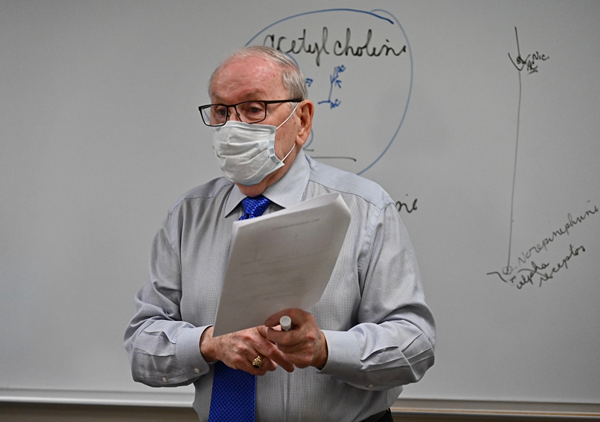Faculty concerned about losing rolling contracts

Anatomy and physiology faculty Carl Knight teaches a class the morning of Jan. 26. Knight has taught at Eastfield for over 50 years. Photo by Rory Moore/The Et Cetera.
February 1, 2022
Some Dallas College faculty say removing the rolling three-year contract eliminates their academic freedom and the security to teach truth.
Andrew Tolle, English faculty and president of Eastfield’s Faculty Association, called the move a “huge defeat for faculty.”
“The faculty have a real reason to be concerned about this,” Tolle said. “We need to be able to go in the classroom and teach the truth, no matter if it’s politically popular or not.”
On Jan. 11 the Dallas College Board of Trustees voted to do away with rolling three-year contracts for faculty and replace them with merit-based contracts for up to three years. Rolling contracts which are currently in effect will be honored until they expire.
For most of its existence, Dallas College has used a rolling three-year contract — the practice of giving faculty a one-year contract for the first three years of their employment and then awarding a three-year contract that is renewed annually. This essentially gave faculty a perpetual three-year contract that could not be terminated without a due process hearing, retirement or death.
Now faculty could potentially receive multi-year contracts for up to three years, but the new policy prohibits them from being given a new contract before the current contract expires. All faculty contract extensions are contingent upon an evaluation process, which is still being finalized.
Trustee Diana Flores said in a Dec. 2 board meeting that faculty need accountability for their performance and the rolling contract practice gave faculty a sense of entitlement.
“In our experience … whatever happens with faculty, it’s sacrosanct,” Flores said. “You can’t touch it.”
In board discussions at the Dec. 2 meeting, Flores proposed limiting the multi-year part of the new policy to two years. She cited the concern that the wording “up to three years” is too similar to the rolling contract practice.
“If we really have a faculty member that needs to be exited based on evaluations, based on performance, based on whatever it is that is set out, we don’t want to prolong it,” Flores said.
Not all the board members agreed with Flores. Trustee Dorothy Zimmermann said limiting the new contracts to two years will make it harder to attract new faculty.
“If you’re moving from out of state or you’re taking a job that you’re going to have to move your family, you’re not going to take a job for two years,” Zimmermann said.
Tolle said faculty provide a vital service and removing the protection offered by the rolling contract threatens their ability to teach.
“We have people with PhDs and master’s degrees and 20 years of industry experience,” Tolle said. “We should never have them worried about what’s going to happen at the end of that year just because they’re teaching what they’re supposed to be.”
Anatomy and physiology faculty Carl Knight, who has taught at Eastfield since the college opened its doors in 1970, said the rolling contracts were a way to give faculty job security. Knight was president of Eastfield’s faculty group in the early 1970s and helped negotiate rolling contracts on behalf of the faculty with then chancellor Bill Priest.
“It’s a very sad day for us because they took away all of our academic freedom,” Knight said. “We’re not free to speak anymore, because if I say anything wrong, they can fire me.”
History faculty Matt Hinckley said whatever evaluation system is used should take into consideration the goal of attracting and retaining faculty for their entire career.
“Having an evaluation system that is affording faculty frequent contact with their department chairs to give them opportunities for constant growth and improvement is … critical,” Hinckley said.
Hinckley added that not renewing faculty contracts should only be a last resort for those who have been frequently told about things they need to improve and haven’t done it.
“That’s what we need to strive for is that nobody is ever taken by surprise with non-renewal,” Hinckley said.
Chancellor-elect Justin Lonon said the administration is not just concerned about dismissing low-performing faculty but retaining good ones.
“The focus with the new evaluation for all employees I think does start a new day and a new opportunity to address the things that we need to address,” Lonon said at the Dec. 2 meeting. “Certainly to have flexibility where we can to retain good people — we want to be able to do that because we have a lot of good people.”
Knight said he is concerned the change to faculty contracts will ultimately have a negative impact on students. He said if faculty are preoccupied with staying in line they will neglect what should be their primary goal — helping students succeed.
“We love our students,” Knight said. “We care about them, and the compassion we have … drives us. It’s not about making money.”



